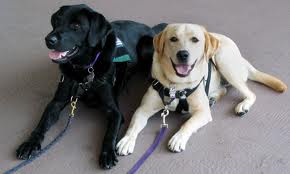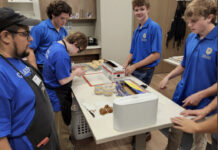Playing catch, rolling over, and performing tricks, the dogs put on a show for the audience, their magnificence putting the crowd in awe. Some say dogs are man’s best friend, but to the Jesuit therapy dog program they are much more than that. Dogs serve as a way to connect to people, no matter who they are or where they come from.
The Jesuit therapy dog program strives to use these dogs as catalysts for helping the less fortunate and people who sometimes just need some company. These trained dogs assist people in expressing themselves and opening up more when they would alternatively close themselves off to everyone. The group of about 12 seniors go to different places each week with their trained dogs to help whoever is at their location. Each week the seniors drive directly to their service site, even though seniors normally check in at Jesuit first. Some students take dogs they have owned previous to taking part in the program while others acquire therapy dogs from Mrs. Cheryl Woolnough of the Student Affairs Office.
Mrs. Woolnough says the therapy dog seniors must be “responsible” because they have to “go directly to their locations,” so a lot of trust is placed in these guys to do their job. When seniors sign up for their service project, those wishing to become dog therapy members must fill out an application to see if they will fit the position. Mrs. Woolnough can only take a small number of people who apply, making the chances of being accepted into the dog therapy service program the most difficult.
Once the list of seniors is released for the Therapy Dog Program, the members go to work to prepare the dogs and themselves for their year of service. Mrs. Woolnough explained that, “Seniors must evaluate their dogs for how they react to certain situations” so that they can train the dogs for those instances. The students then begin to train their dogs so they can properly respond to children and elderly when approached by them. After many sessions with the dogs, the seniors can test to see if they’re finally ready, and then start bringing them to the sites.
They attend a variety of places with their dogs throughout the year, varying from senior residences, to schools, to groups of people with mental disabilities. The dogs bring an abundance of joy and happiness to everyone they meet, which is the main reason the club was created. Mrs. Woolnough says that her dog and “I attend various centers throughout the year” to provide the people with “something fun and different” from what they’re used to.
The program has been a large success over the past years, and as one of the most highly sought senior service programs, it is likely that it will continue to be a success in the future. Mrs. Woolnough is very proud of the program that has come out of her initial plan years ago, and she is always “proud of the seniors” that show so much responsibility and care for their role in the group.
You don’t even need a dog to be a part of the program, so no matter what your background is, maybe Senior Dog Therapy is the service group for you! So if you have any passion or interest for this type of service you can always inquire more from Mrs. Woolnough to see what else this group offers. Juniors, as you think about what service program might interest you for next year, keep Dog Therapy in mind because spots go quickly for the program!
Contact Mrs. Woolnough in the Office of Student affairs for more information.






